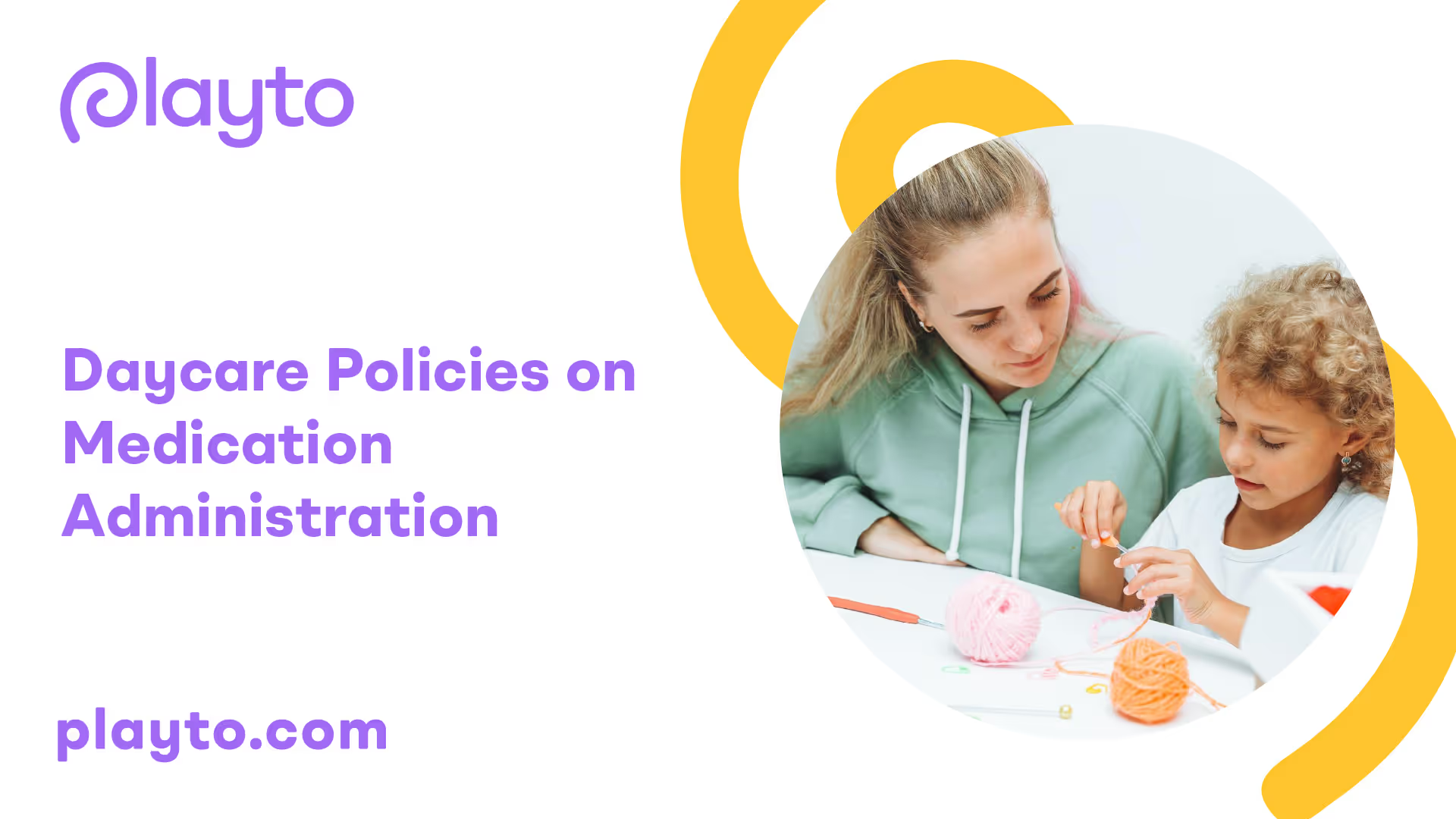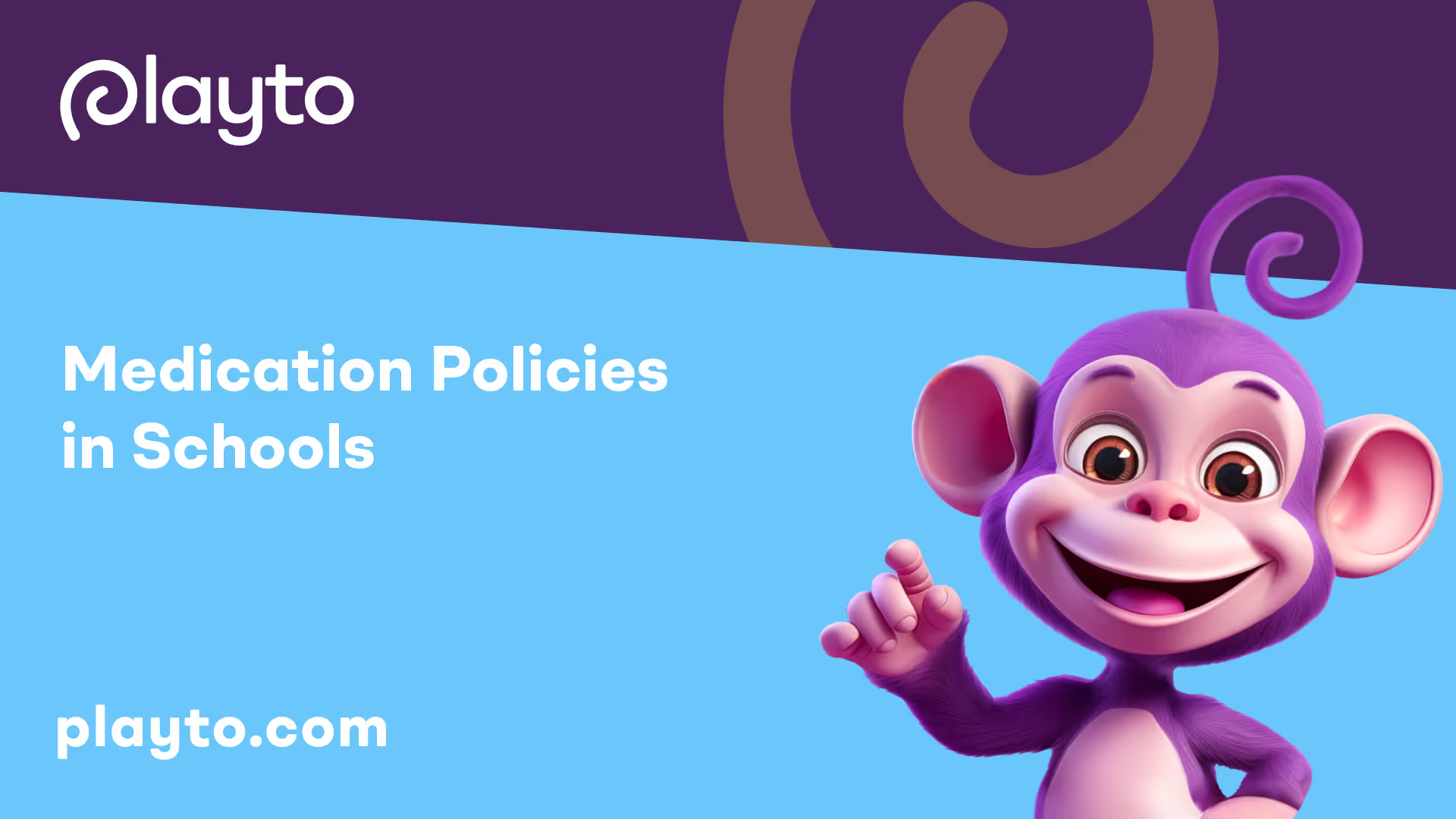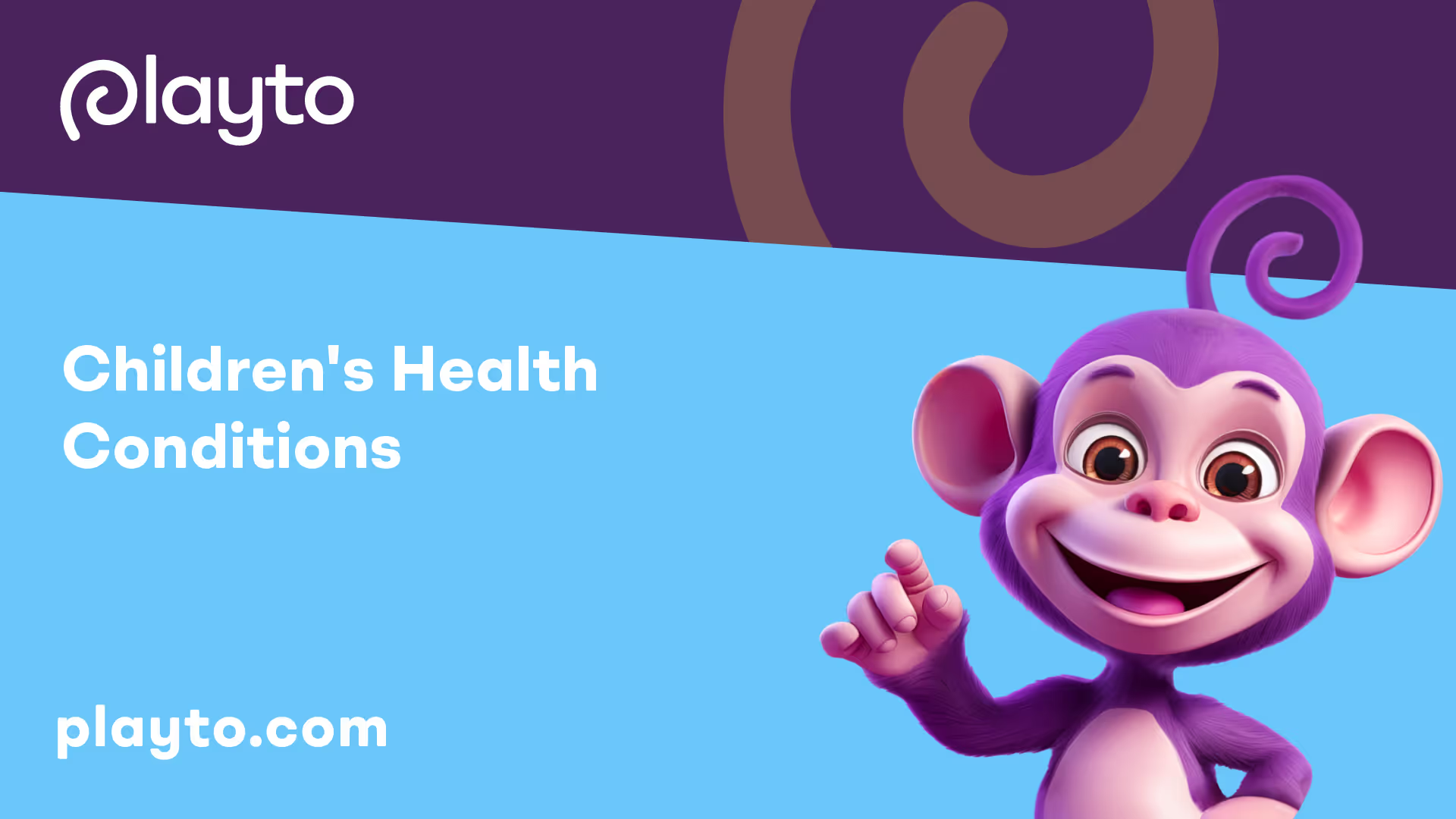Medication Administration in Daycare
When it comes to medication administration in daycare settings, proper handling and adherence to specific procedures are of utmost importance. Ensuring the well-being and health of children in daycare requires a thorough understanding of medication policies and protocols. This section will delve into the importance of proper medication handling and the training requirements for staff.

Importance of Proper Medication Handling
Child care directors and providers have the critical responsibility of ensuring that children receive the appropriate dose of the right medication at the right time while in their care [1]. Proper medication handling is crucial to prevent medication errors and ensure the safety of the children.
To ensure proper medication handling, daycare providers should:
- Follow state or territory child care licensing regulations regarding medication administration. These regulations outline specific guidelines and protocols that must be followed to maintain the health and safety of the children.
- Develop comprehensive medication policies that address medication storage, handling, administration, documentation, and parental consent. These policies should align with state regulations and best practices.
- Maintain clear communication with parents regarding medication administration. Parents should provide detailed instructions, including dosage, frequency, and any special considerations.
- Store medications in a secure and designated area, away from children's reach, and in accordance with state regulations.
- Keep medications in their original pharmacy or manufacturer-labeled containers to ensure accurate identification and prevent confusion.
- Implement rigorous documentation procedures to track medication administration, including recording the date, time, dosage, and any observations or side effects.
By prioritizing proper medication handling, daycare providers can create a safe and supportive environment for children requiring medication while under their care.
Training Requirements for Staff
To ensure the safe and effective administration of medication in daycare settings, staff members must receive appropriate training. State or territory child care licensing offices monitor licensed programs to ensure that staff and providers meet all training required by their specific regulations [2]. In addition, federal law mandates specific health and safety training for staff members who care for children receiving federal financial assistance.
Daycare staff should receive training that covers:
- Medication administration protocols and procedures, including proper dosage calculation and administration techniques.
- Recognizing common symptoms and adverse reactions to medications.
- Identifying and managing medication errors or emergencies.
- Documentation requirements and record-keeping procedures.
- Communication and collaboration with parents and healthcare professionals.
By ensuring that staff members are well-trained in medication administration, daycare centers can provide a safe and supportive environment for children with medical needs.
In the next section, we will explore the specific medication policies in schools, including immunity laws for medication administration and transportation and labeling requirements for medications. Stay tuned to learn more about the regulations that govern medication administration in daycare settings.
Medication Policies in Schools
When it comes to medication administration in schools, there are specific policies in place to ensure the safety and well-being of the students. Two important aspects of these policies include immunity laws for medication administration and guidelines for transporting and labeling medications.

Immunity Laws for Medication Administration
In some states, immunity laws are in effect to protect school employees who administer medications to students according to written instructions from parents or legal guardians. These laws provide protection in case of adverse drug reactions suffered by the students as a result of dispensing such medication.
For example, Colorado law provides immunity to school employees who administer medication to students in accordance with written instructions from parents or legal guardians in the event of an adverse drug reaction. These laws are in place to ensure that students receive necessary medication without placing liability solely on the school employees.
Transporting and Labeling Medications
Proper transportation and labeling of medications are essential to maintain their safety and effectiveness. To ensure the correct administration of medications, it is crucial that medications are transported to and from school by a responsible family member. This person should deliver the medications to a designated individual in the school, ensuring that they are in their original pharmacy or manufacturer-labeled containers.
In Colorado, for instance, medications should be transported in their original containers and delivered to a designated individual in the school by a responsible family member [3]. The original labeling provides important information about the medication, such as dosage instructions and expiration dates, which helps ensure accurate administration.
By following these guidelines for transporting and labeling medications, schools can maintain a safe and organized system for medication administration.
It's important for parents and guardians to familiarize themselves with the specific medication policies of their child's school to ensure compliance and the safety of their child. Understanding these policies helps facilitate a smooth process for medication administration and enhances the overall well-being of students. To learn more about daycare policies, you may also want to explore topics such as daycare illness policies, daycare hygiene practices, daycare policies on screen time, and daycare policies on personal belongings and toys.
Children's Health Conditions
When it comes to medication administration in daycare settings, it is important to consider the prevalence of chronic health conditions among children and the commonly administered medications. By understanding these factors, daycare providers can better cater to the healthcare needs of the children under their care.

Prevalence of Chronic Health Conditions
In the United States, a significant number of school-aged children and adolescents have at least one chronic health condition. According to the Colorado Department of Education, more than 40% of school-aged children and adolescents fall into this category. These chronic health conditions can include asthma, diabetes, epilepsy, ADHD, and various other ongoing conditions.
The presence of chronic health conditions highlights the importance of medication administration in daycare settings. By safely and effectively administering medications, daycare providers can help children manage their conditions, ensuring they are able to participate fully in daycare activities.
Commonly Administered Medications
An estimated 25% to 43% of children in the United States take medications to treat various health issues. These medications may be used to manage conditions such as asthma, diabetes, epilepsy, ADHD, and more. Additionally, millions of children may require prescription or over-the-counter medications for short-term use to address seasonal allergies, occasional pain, or common illnesses like colds.
It is crucial for daycare providers to be aware of the medications commonly administered to children in their care. By having knowledge of these medications, daycare staff can ensure proper administration and monitor for any potential side effects or interactions. This understanding enables daycare providers to implement effective medication policies and procedures, safeguarding the well-being of the children.
Being knowledgeable about the prevalence of chronic health conditions and commonly administered medications allows daycare providers to create and implement appropriate medication administration policies. By working together with parents and healthcare professionals, daycare staff can ensure the safe and effective management of children's health conditions while they are under their care. For more information on daycare policies, check out our articles on daycare illness policies: when to keep your child home, daycare hygiene practices and policies, and daycare policies on screen time and daycare policies on personal belongings and toys.
Parental Role in Medication Administration
When it comes to medication administration in daycare, parents play a crucial role in ensuring the safe and effective management of their child's medical needs. This includes sharing relevant medical information and collaborating with school staff to create a supportive environment.
Sharing Medical Information
Parents and families have a central role in sharing key medical information with their child's daycare. It is important to provide detailed and accurate information about the child's health conditions, medications, and any specific instructions from healthcare professionals. This information allows daycare staff to have a comprehensive understanding of the child's medical needs and ensures that the appropriate care can be provided.
To facilitate effective communication, parents should provide written documentation of their child's medical needs, including medication schedules, dosages, and any potential side effects. This helps ensure consistency and accuracy in medication administration. Additionally, it is important to inform the daycare of any changes to the child's health condition or medication regimen in a timely manner.
Collaboration with School Staff
Collaboration between parents and daycare staff is vital to ensure the proper administration of medication. Daycare providers are often trained and licensed to administer medications, store supplies, and monitor children for adverse reactions or other concerns [4].
Parents should establish open lines of communication with the daycare staff, maintaining regular dialogue about their child's medication needs. This includes discussing any changes in medication, dosage adjustments, or new instructions from healthcare providers. By working together, parents and daycare staff can ensure that the child's medication administration is consistent and in accordance with the prescribed regimen.
Moreover, parents should provide medications to the daycare in their original containers, properly labeled with the child's name, dosage instructions, and any necessary warnings. Clear and detailed procedures for medication administration protect children from potential mistakes and ensure their health and safety [4].
By actively participating in the sharing of medical information and collaborating with daycare staff, parents contribute to a safe and supportive environment for their child's medication administration. Together, parents and daycare providers can ensure that children's medication needs are met with care and diligence.
Safety Procedures for Medication
Ensuring the safety of children is paramount when it comes to medication administration in daycare settings. To minimize risks and promote a secure environment, daycare facilities implement various safety procedures. This section will explore error prevention measures and the concept of self-administration by students.
Error Prevention Measures
Daycare centers prioritize error prevention to safeguard the well-being of children. The following measures are commonly implemented to minimize the risk of medication errors:
- Documentation and Verification: Accurate and thorough documentation is essential when administering medication. Staff members are responsible for recording the time, dosage, and any specific instructions related to the medication. Additionally, a verification process is crucial to ensure that the correct medication is given to the intended child.
- Medication Storage: Proper storage of medications is critical to maintaining their efficacy and safety. Medications should be stored in a secure location, out of reach of children, and at the appropriate temperature as specified by the medication instructions.
- Staff Training and Education: Adequate training and education for daycare staff are essential to ensure they possess the necessary knowledge and skills required for proper medication administration. Regular training sessions and updates on medication protocols help mitigate the risk of errors.
- Clear Communication: Open and effective communication among staff members, parents, and healthcare providers is crucial for medication administration. This includes sharing information about a child's medical condition, allergies, and any changes in medication or dosage.
Self-Administration by Students
In certain situations, children may be capable of self-administering emergency medications, such as those for asthma attacks or anaphylactic shock. Federal law encourages schools, including daycare centers, to allow children to self-administer these medications when necessary. This approach recognizes that children are often familiar with their own warning signals and can act quickly in emergency situations [4].
Allowing self-administration by students can save valuable time in emergency scenarios. Children who are familiar with their own symptoms can promptly respond to signs of an asthma attack or anaphylactic shock, potentially preventing severe consequences.
To support the self-administration of emergency medications, daycare centers should establish clear guidelines and procedures. This includes obtaining written consent from parents, ensuring that children are trained in proper administration techniques, and maintaining a system to keep emergency medications readily accessible.
The American Academy of Pediatrics (AAP) advocates for coordinated efforts between parents, school staff, and healthcare providers to support children who require medication administration at school. The AAP also supports programs that provide emergency medications at low or no cost to schools, emphasizing the importance of accessible and affordable medication options.
By implementing error prevention measures and considering self-administration options when appropriate, daycare centers strive to create a safe environment for medication administration. These procedures, along with clear communication and ongoing training, contribute to the overall well-being and health of children in daycare settings.
Advocacy and Support
Ensuring the proper administration of medication in daycare settings requires the support of various organizations and advocacy groups. In this section, we will explore the recommendations provided by the American Academy of Pediatrics (AAP) and the importance of access to emergency medications.
American Academy of Pediatrics' Recommendations
The American Academy of Pediatrics (AAP) is a leading organization dedicated to promoting the health and well-being of children. They provide valuable recommendations on various aspects of childcare, including medication administration in daycare settings. The AAP emphasizes the need for a coordinated team approach to support children who require medication at school or daycare.
Their recommendations include:
- Written Medication Authorization: The AAP advises parents and healthcare providers to complete written authorization forms that include detailed instructions for medication administration. This helps ensure accurate dosing and minimizes the risk of errors.
- Training for School Staff: The AAP recommends that daycare staff receive appropriate training on medication administration. This training should cover topics such as proper storage, handling, and documentation of medications. It is crucial for staff to understand the potential side effects and adverse reactions of medications to ensure the safety of the children in their care.
- Communication and Collaboration: The AAP emphasizes the importance of open communication and collaboration between parents, healthcare providers, and daycare staff. This facilitates the sharing of important medical information and ensures that all parties are well-informed about the child's health condition and medication needs.
Access to Emergency Medications
In emergency situations such as asthma attacks or anaphylactic shock, quick access to medication can be life-saving. Federal law encourages schools and daycares to allow children with these conditions to self-administer emergency medications [4]. This is particularly important because children are often familiar with their own warning signals, allowing them to act swiftly when seconds count.
To support this effort, the AAP advocates for programs that provide emergency medications at low or no cost to schools. This ensures that children have access to the necessary medication even if they don't have their own supply readily available.
By following the recommendations of organizations like the American Academy of Pediatrics, daycare providers can implement effective policies and practices for medication administration. These recommendations promote the well-being and safety of children with specific health conditions, ensuring that they receive the necessary medications in a timely and appropriate manner.
Next, we will explore the safety procedures and error prevention measures that daycare centers should implement to ensure the proper administration of medication.
